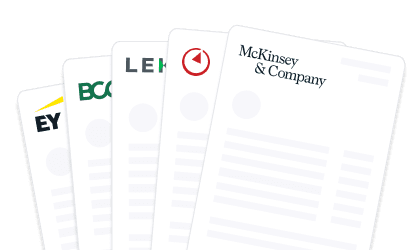Consulting Exit Opportunities: Most Popular Routes for Ex-Consultants (2026)
Discover the most popular consulting exit opportunities in 2026. Learn about high-impact career paths in finance, tech, corporate strategy, and more after consulting.
Posted January 6, 2026

Join a free event
Learn from top coaches and industry experts in live, interactive sessions you can join for free.
Table of Contents
If you're in management consulting and considering a change, you're not alone. Many consultants leave consulting firms each year to explore other career paths. The skills and experience you’ve gained as a management consultant are highly transferable and open doors to various exciting roles.
In this article, we will explore the most popular exit opportunities for former consultants in 2026. Whether you're aiming for the corporate world, entrepreneurship, or finance, there are plenty of routes to consider.
What Are Consulting Exit Opportunities?
Consulting exit opportunities refer to the career paths that management consultants pursue when they leave consulting firms. Consultants are well-equipped with leadership skills, problem-solving abilities, and a strong consulting background, which make them valuable in other industries. These exit routes typically lead to roles in private equity, corporate development, tech companies, financial analysis, and even entrepreneurship.
But why do many consultants leave consulting firms in the first place? Factors like work-life balance, the desire for more executive leadership roles, or a shift in personal circumstances often play a part. Whether it's the allure of better compensation or the chance to solve different types of complex business problems, consulting exit opportunities can lead to significant career growth.
Most Common Consulting Exit Opportunities
Here’s a quick overview of the most popular exit routes for consultants:
| Exit Path | Description |
|---|---|
| Corporate Strategy | High-level strategic roles in large corporations to drive business development. |
| Private Equity | Investment firms are seeking consultants for financial analysis and strategic guidance. |
| Venture Capital | Start-up investment firms value consultants' market analysis and business strategy skills. |
| Technology | Roles in product management, business development, or corporate strategy in tech companies. |
| Finance | Transition into banking, hedge funds, and equity research using financial and analytical skills. |
| Non-Profits | Strategy, operations, or leadership roles in mission-driven organizations. |
| Entrepreneurship | Starting or leading your own business, often leveraging a consulting background and expertise. |
This table summarizes the most common exit opportunities for former management consultants. Now let’s explore each of these career paths in more detail to help you determine which route best aligns with your skills and goals.
The Most Popular Consulting Exit Paths for 2026
Consulting exit opportunities are diverse, and former consultants find success in several industries. Below are some of the most common career paths ex-consultants pursue in 2026:
Moving into Finance: Private Equity, Hedge Funds, and Corporate Finance
One of the top exit routes for consultants is moving into the finance industry. The problem-solving and strategic thinking that management consultants develop are highly valued by private equity firms, hedge funds, and corporate finance departments.
Private Equity & Specialized Funds
- Why it’s a great fit: Consultants possess a deep understanding of financial analysis and market research, which are key in private equity. Your ability to analyze complex business problems and develop strategic solutions is highly valued in investment funds.
- Roles: Investment analysts, associates, and directors in private equity firms, specialized funds, or portfolio companies.
- Compensation: High earning potential, especially when working with top private equity firms.
Read: Consulting to Private Equity: How to Make the Transition Successfully
Hedge Funds and Equity Research
- Why it’s a great fit: Ex-consultants, particularly those with experience in financial analysis and asset management, excel in hedge funds and equity research roles. Your background in strategic thinking, market research, and problem-solving gives you an edge in identifying profitable investment opportunities.
- Roles: Research analysts, portfolio managers, and investment bankers in hedge funds.
Transitioning to Tech: Product Management and Strategy Roles
Tech companies actively seek former consultants to fill strategy and product management roles. Management consultants bring valuable expertise in corporate strategy, leadership skills, and project coordination, which are essential for scaling tech companies.
Tech Company Roles
- Why it’s a great fit: Tech companies value consultants for their strategic thinking and ability to solve complex business problems. As a former consultant, you will be equipped to lead cross-functional teams and drive product development initiatives.
- Roles: Product management, business development, and corporate development positions in top tech companies.
- Compensation: Competitive salaries with bonuses and equity in fast-growing tech companies.
Leadership Skills in Tech
- Why it’s a great fit: The leadership skills you developed at consulting firms help you manage teams and influence decisions within the tech industry. Consultants are often hired into leadership roles, where they can apply their functional expertise to drive business results.
Corporate Roles: Strategy, Business Development, and Corporate Development
For many former consultants, moving into corporate roles is a natural progression. Consulting firms offer exposure to various industries, and many consultants find success in large corporations, driving strategic initiatives.
Corporate Strategy & Business Development
- Why it’s a great fit: The consulting industry teaches you how to manage business development efforts, formulate strategies, and drive corporate growth. Your background in consulting equips you with the skills needed to manage multi-million-dollar projects and execute growth strategies in established companies.
- Roles: Corporate strategy, business development, and corporate finance positions in large corporations.
Executive Leadership
- Why it’s a great fit: With your consulting experience, you’re well-positioned for senior leadership roles that require strategic oversight and the ability to manage complex operations. Many consultants move into executive positions such as Chief Operating Officer (COO), Chief Strategy Officer (CSO), and Chief Financial Officer (CFO).
Entrepreneurship: Launching a Start-up or Freelance Consulting
Many consultants leave consulting firms to become entrepreneurs or start their own freelance consulting businesses. The skills gained during a career in consulting, such as market research, project management, and financial analysis, provide a solid foundation for entrepreneurship.
Freelance Consulting
- Why it’s a great fit: Former consultants often have a large network and the consulting experience necessary to work independently. Freelance consulting offers flexibility, allowing you to work with various industries and solve diverse problems.
- Roles: Independent consultants, strategic advisors, and coaches for startups and growing companies.
Starting a Business
- Why it’s a great fit: Consultants have the leadership skills, strategic thinking, and problem-solving abilities required to run a business. Starting your own business allows you to apply these skills directly to create solutions for clients and build your own portfolio of clients.
- Roles: Entrepreneur, founder, or co-founder in various industries.
Non-Profit and Public Sector Opportunities
Some former consultants move into the non-profit or public sector, driven by a desire to make a meaningful impact. Consulting skills such as strategic thinking, project coordination, and problem-solving are highly valued in government roles, NGOs, and non-profit organizations.
Government and Public Sector Roles
- Why it’s a great fit: Consultants are skilled at analyzing problems and developing solutions that benefit the public. Many consultants find fulfilling careers in the public sector, helping shape policies, improve government processes, and contribute to social initiatives.
- Roles: Policy advisors, project managers, and strategy consultants for government agencies.
Non-Profit Roles
- Why it’s a great fit: Many former consultants find meaningful work in the non-profit sector, where they can apply their strategic and problem-solving skills to create social change.
- Roles: Non-profit strategy, business development, and fundraising leadership roles.
How Consulting Skills Transfer to Other Industries
The skills you gain from a career in management consulting make former consultants strong candidates in many different industries. Consulting firms teach people how to solve complex business problems, work with data, and lead teams. These skills are useful not just in consulting, but also in finance, technology, corporate jobs, and even starting your own business.
From Problem-Solving to Implementation
Consultants are trained to solve business problems by identifying issues, creating solutions, and leading implementation. These skills make you highly valuable in industries like private equity, tech, and corporate development, where complex problems need practical solutions.
Strategy and Market Research Expertise
The strategic thinking and market research skills consultants develop allow them to thrive in roles that require in-depth analysis and strategic decision-making. These skills are essential in areas like financial analysis, corporate strategy, and business development.
When Do Consultants Leave Consulting? What to Consider Before Making the Move
Understanding when and why consultants leave consulting firms is important when considering your next move. Here are some key factors that influence a consultant’s decision to move on to new career paths:
Burnout and Personal Circumstances
Consultants often leave consulting firms because of burnout or personal reasons. The demanding hours and high-pressure environment can take a toll on work-life balance, prompting many consultants to seek better options for a balanced lifestyle.
Career Growth and Opportunities
Some consultants leave consulting firms because they feel they’ve reached a ceiling in terms of career growth. Moving into new industries or corporate roles often offers more opportunities for advancement, better compensation, and more control over their career trajectory.
Preparing for a Successful Exit: How to Position Yourself for New Opportunities
Once you’ve decided to leave consulting, it’s important to position yourself effectively for your next career move. Here are some tips to help you prepare:
Job Search Tips for Former Consultants
Leverage your consulting background by emphasizing your leadership skills, problem-solving abilities, and experience managing complex projects. Customize your resume and LinkedIn profile to highlight your expertise and the value you bring to your new career path.
Interviewing for Corporate or Tech Roles
The interview process for corporate or tech roles can be different from the consulting world. Prepare by practicing how to articulate your consulting experience in terms that resonate with employers in other industries. Focus on your ability to solve problems, lead teams, and contribute to business development.
Ex-Consultants Who Have Successfully Made the Transition: Case Studies
Here are two case studies of former consultants who successfully leaped into new career paths:
Case Study 1: Former McKinsey Consultant in Private Equity
A former McKinsey consultant transitioned to private equity after several years in management consulting. With a background in financial analysis, market research, and strategic thinking, they quickly adapted to the private equity world, managing portfolio companies and making investment decisions.
Case Study 2: Ex-Consultant Starting a Tech Start-up
Another consultant left a top consulting firm to start their own tech company. Drawing on their experience in problem-solving, market research, and project management, they successfully scaled their business and now lead a growing start-up.
The Bottom Line
Your consulting career has provided you with a wealth of skills that are highly transferable across industries. Whether you're looking to enter finance, tech, or start your own business, consulting exit opportunities can lead to new and exciting career paths. The next step is to evaluate your options and start positioning yourself for success. For more resources and career coaching, explore Leland’s services to help you navigate your career transition.
Take the Next Step in Your Career After Consulting
Whether you're exploring opportunities in private equity, tech, or entrepreneurship, or just need guidance on your next move, our expert coaches are here to help. Work 1:1 with our expert coaches to make sure you have everything you need for a successful transition.
Read these next:
- How to Pass the Consulting Screening Interview
- Bain Interview Guide: Rounds, Questions, & Tips
- Consulting Networking 101: How to Network to Land Offers
- Consulting vs. Investment Banking: Differences, Pros & Cons, and How to Decide
- How to Transition From Investment Banking to Consulting
FAQs
Do consultants have good exit opportunities?
- Yes, consultants have excellent exit opportunities across industries like finance, technology, corporate strategy, and entrepreneurship due to their strong problem-solving, leadership, and analytical skills.
What are the exit options after consulting?
- Common exit options for consultants include roles in private equity, venture capital, corporate strategy, tech companies, finance, and non-profit organizations.
What jobs can you transition out of consulting?
- Consultants can transition into jobs in private equity, hedge funds, product management, corporate development, entrepreneurship, or strategy roles in large corporations.
What can you do after consulting?
- After consulting, you can pursue careers in finance, technology, corporate strategy, venture capital, non-profits, or start your own business.
What do people typically do after consulting?
- Many consultants transition to roles in finance (like private equity or hedge funds), technology (such as product management), corporate strategy, or entrepreneurship.
What is the next role after a consultant?
- Common next roles for former consultants include positions in private equity, corporate strategy, venture capital, or senior leadership in tech or large corporations.
What jobs can you move to from consulting?
- Ex-consultants often move to roles in finance (private equity, hedge funds), tech (product management), corporate strategy, or start their own businesses.

































